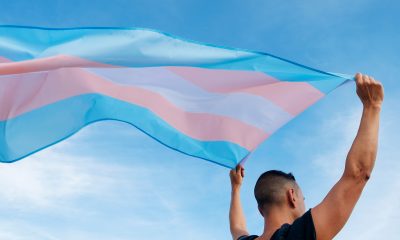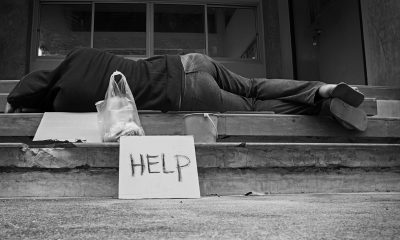United Kingdom
Transgender girl’s murder sparks outrage across UK
Two teenagers have been arrested in connection with Brianna Ghey’s death

The body of 16-year-old Brianna Ghey was discovered this past Saturday afternoon in the Linear Park in Culcheth, a small community located between the port city of Liverpool and metropolitan Manchester. She had been repeatedly stabbed and was pronounced dead at the scene by police and paramedics who responded.
Ghey, who lived in Birchwood, Cheshire, and was a junior at Birchwood Community High School had been bullied for her transgender identity, according to comments left on social media posts by friends and fellow students.
Her friends alleged she had been bullied and gang beaten at Birchwood Community High School for several years over the “simple reason of being trans.” In another post one claimed that school administrators, staff and faculty was aware of the bullying “refused to intervene.”
Cheshire Constabulary Detective Chief Supt. Mike Evans told British media outlets: “At this time, there is no evidence to suggest that the circumstances surrounding Brianna’s death are hate related,” adding “Patrols have been stepped up in the local area and officers will remain in the Culcheth area to provide reassurance and address any concerns that residents may have.”
On Monday Evans said that police believe the death of Ghey was “targeted” and that two teenagers, a 15-year-old boy and girl, both local residents, have since been arrested on suspicion of murder and are currently in custody.
Evans told reporters that a full investigation into the death are underway and that his officers are “doing all that we can to establish the exact circumstances of what has happened.”
“At this time, there is no evidence to suggest that the circumstances surrounding Brianna’s death are hate-related,” he stated.
As news coverage of the 16-year-old’s death spread, several British press outlets misgendered and deadnamed her, which drew the ire and criticism of LGBTQ advocacy groups including the Trans Safety Network which posted on Twitter: “We are appalled to note that @thetimes have now updated their article on the killing of Brianna Ghey to remove all references to her being a girl and to add her deadname.”
We are appalled to note that @thetimes have now updated their article on the killing of Brianna Ghey to remove all references to her being a girl and to add her deadname.
— Trans Safety Network (@trans_safety) February 13, 2023
Previous version:https://t.co/FYWQ4SMDyi
Current version:https://t.co/g4TNG8p7f3
Ash Sarkar, a a senior editor at London-based Novara Media and a leading feminist progressive voice in U.K. politics, tweeted her anger at the misgendering:
A 16 year old girl has been murdered, taken from her friends and family when her life was only just beginning. I cannot fathom the callousness involved in making the editorial decision to violate her dignity in death.
— Ash Sarkar (@AyoCaesar) February 13, 2023
Disgusting from @thetimes. https://t.co/NHB55kaaQK
As a result of the outcry, the Times did revise its coverage, although other outlets including the BBC News and Sky News failed to mention that Ghey was trans in their initial reporting.
A Trans Safety Network spokesperson told Britain’s leading LGBTQ media outlet PinkNewsUK:
“Whatever the specific circumstances leading to Brianna Ghey’s death, we are currently living through a period of unprecedented moral repugnance towards trans people, largely channelled through a compliant media which shows less and less respect for trans peoples’ lives and humanity.
“We have seen how even in death, the press has chosen to compound this harm by publicly disrespecting Brianna’s identity until public outcry forced them to reconsider.
“It shouldn’t take a public show of grief to value the lives of trans children, and her life should have been valued enough to not have been taken in the first place,” the spokesperson added.
The local MP, Charlotte Nichols, told PinkNewsUK that the local community is “reeling from the news” of Ghey’s death.
“Brianna’s family have been very clear in their statement who Brianna was: ‘a much-loved daughter, granddaughter and baby sister’. That should be the starting point for any coverage, and how we all talk about her,” Nichols told PinkNewsUK.
“Brianna was trans, and at this point it is not clear whether that was relevant to the circumstances surrounding her death, but there is absolutely no need whatsoever for anyone to publish her deadname when identifying her as trans in media coverage.”
“The least we can all do for Brianna is remember her for who she was, and not who she wasn’t, out of respect not only for Brianna but for her grieving family and friends,” she added.
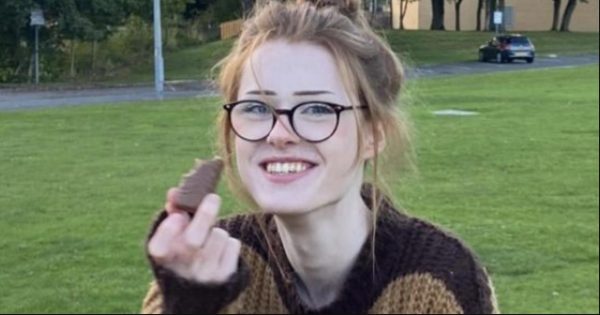
“Brianna was a much loved daughter, granddaughter and baby sister. She was a larger than life character who would leave a lasting impression on all that met her. Brianna was beautiful, witty and hilarious. Brianna was strong, fearless and one of a kind,” her parents said in a statement released over the weekend.
“The loss of her young life has left a massive hole in our family, and we know that the teachers and her friends who were involved in her life will feel the same.
“We would like to thank everyone for their kind words and support during this extremely difficult time. We would like to thank the police for their support, and witnesses for helping with the investigation.”
A GoFundMe fund to assist the family has already raised £73,083 ($88841.16).
A verified fundraiser has been set up in memory of 16-year-old Brianna Ghey, after she was stabbed to deathhttps://t.co/Tju22qtZmy
— GoFundMeUK (@GoFundMeUK) February 13, 2023
United Kingdom
King Charles III unveils memorial to British LGBTQ servicemembers
Ceremony is first time monarch held ‘official engagement’ in support of community.
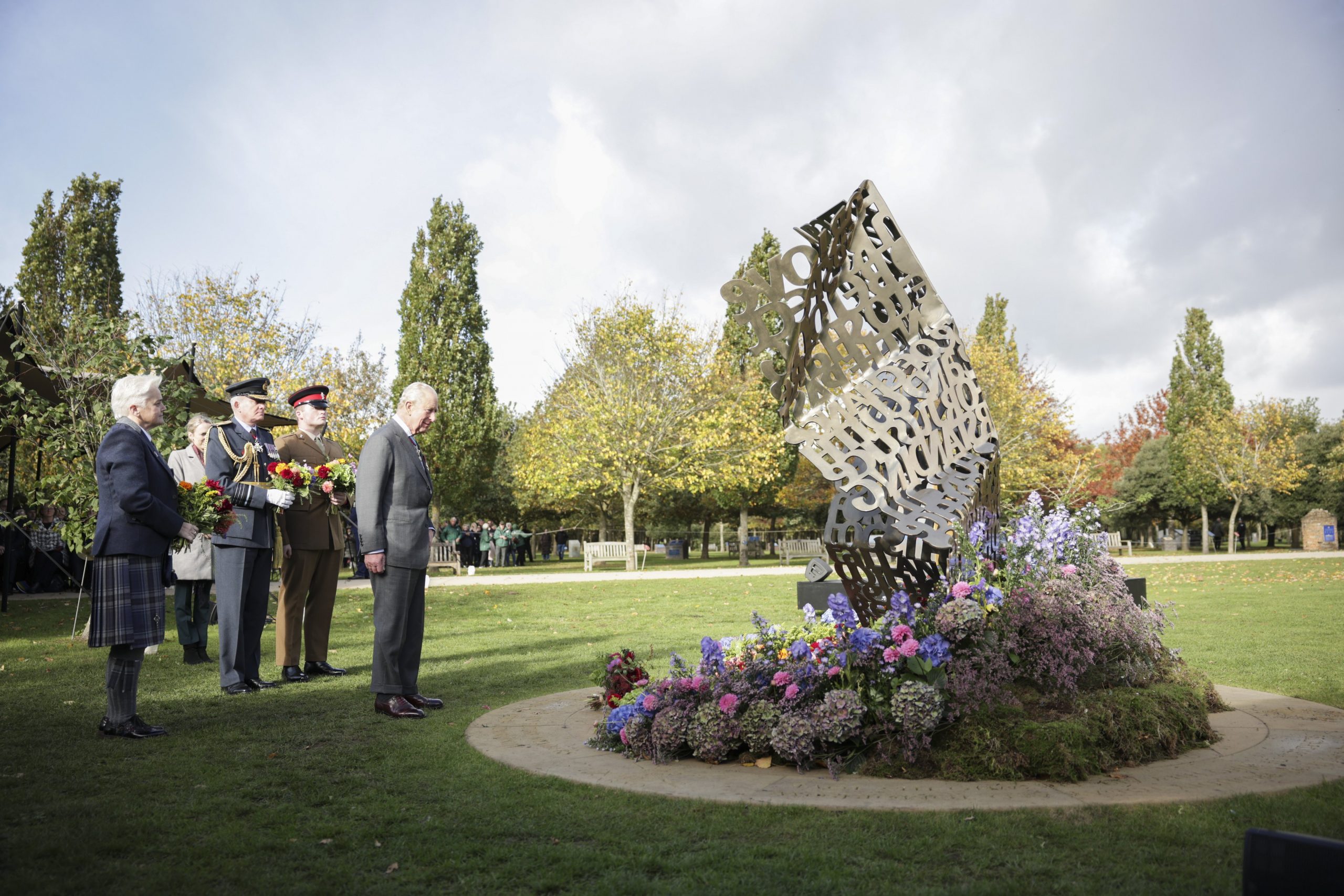
King Charles III on Monday unveiled a memorial to British LGBTQ servicemembers.
The memorial is located at the National Memorial Arboretum in Burton-on-Trent, England.
“We see all the LGBT+ serving members and veterans of the Armed Forces, and we salute you,” said the Royal Family in a social media post that contained a video of Charles placing flowers at the memorial.
“Throughout the 20th century, gay men, lesbians, and bisexual people were banned from serving in the UK Armed Forces,” it adds.
We see all the LGBT+ serving members and veterans of the Armed Forces, and we salute you. 🌈
This afternoon at the National Memorial Arboretum, The King attended the Dedication Ceremony of a new memorial in recognition of all LGBT+ people who have served and continue to serve… pic.twitter.com/tEbkzsQHTG
— The Royal Family (@RoyalFamily) October 27, 2025
“Today marks a historic step for healing and reconciliation,” said the British Defense Ministry.
The BBC notes gay servicemembers could not serve openly in the UK until 2000.
Monday’s ceremony is the first time Charles held an “official engagement” in support of LGBTQ rights.
His mother, Queen Elizabeth II, gave royal assent to the Sexual Offenses Act of 1967, which decriminalized consensual same-sex sexual relations among men in England and Wales who are at least 21, and to a law that extended marriage rights to same-sex couples in England and Wales in 2014. Elizabeth, among other things, also pardoned Alan Turing, an acclaimed World War II codebreaker and computer scientist who died by suicide two years after his 1952 conviction for “gross indecency.”
Then-Prime Minister Rishi Sunak in 2023 apologized to LGBTQ servicemembers who “endured the most horrific sexual abuse and violence, homophobic bullying, and harassment, all while bravely serving this country.”
United Kingdom
LGBTQ Brits fight back against the far-right
Tommy Robinson led Sept. 13 rally in London
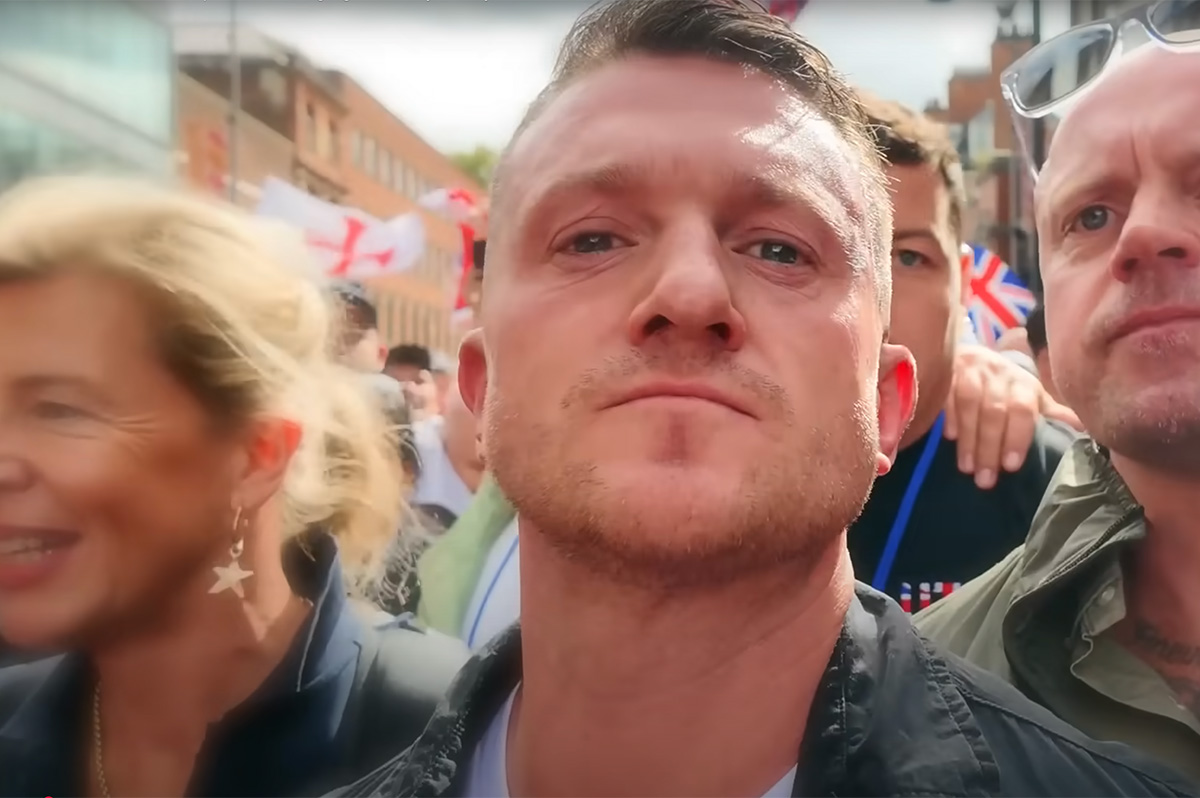
When far-right politics became more and more influential across Europe, fueled by American attempts to spread anti-LGBTQ bigotry in the Western world, LGBTQ people in the UK have begun to furiously fight back.
Let me be clear: when I first came to the UK as a queer asylum seeker in 2018, it was one of the most LGBTQ-friendly countries I had ever seen. But recently, things have changed. The politics toward refugees and trans people have become much harsher.
On Sept. 13, nearly 150,000 people joined a rally led by far-right influencer Tommy Robinson, which left dozens of police officers injured. American billionaire Elon Musk addressed protesters on Whitehall via video link, urging British people to start a revolution against being “too woke.” This protest and this speech are still widely discussed on British TV and social media, or, more precisely, not the news itself but the fear of a far-right turn and the bigoted influence from another side of the ocean it created.
Many local LGBTQ groups, like Worcester LGBT, one of the biggest LGBTQ groups in Worcester, made a statement against these events to a local newspaper:
“These movements often promote anti-immigration, anti-Muslim, and anti-LGBTQ+ views that threaten the safety, dignity, and human rights of many of the people we support. As a network that supports LGBTQ+ asylum seekers and refugees, WLGBT stands firmly against all forms of hate, racism, xenophobia, and Islamophobia. We know from experience that far-right rhetoric can directly fuel harassment, discrimination, and violence — especially for people at the intersection of multiple vulnerabilities.”
And then, there were more reasons to be concerned.
On Sept. 17, when President Donald Trump and his wife Melania visited the UK, many queer people in the UK decided they had had enough. Queer groups circulated information about anti-Trump protests and issued statements.
Trans Kids Deserve Better, a British group for transgender rights led by trans youth, told the Washington Blade:
“Donald Trump is a fascist. He rolled back laws protecting trans rights for both children and adults in America, causing irreversible damage to the trans community. These protections were flawed, but they still mattered. The rollback and rhetoric from Trump are especially harmful for trans youth.
Trump being given a state visit to the UK by Keir Starmer really shows his morally reprehensible stance on trans rights and human rights. While we at Trans Kids Deserve Better have not directly organized anti-Trump protests, we have reposted callouts to walk out of school (organized by Socialist Students) as well as a march organized by UK Stop Trump.
Some people like to pretend that the far right and their anti-immigrant rhetoric have no impact on trans people. Some of these people are actually trans themselves, going along with hate to seem more ‘presentable,’ such as Blaire White and Caitlyn Jenner. At Tommy Robinson’s most recent Unite The Kingdom rally, Elon Musk came on to speak. Musk has made it his mission to destroy the so-called ‘woke mind virus’ and has platformed transphobic organisations such as Gays Against Groomers, who claim all trans people are just confused gay people. By allowing these transphobes to spread their hate, Tommy Robinson is complicit in the hatred against us all.”
Hundreds counterprotested Robinson’s latest rally and thousands protested Trump’s visit, including many LGBTQ people, as the protests were widely promoted by local LGBTQ groups. Stand Up To Racism, which organizing counter-protesters against Robinson and also called the anti-Trump demonstration, has always supported LGBTQ rights and counts many LGBTQ people among its supporters, wich I could say for sure by my own experience with the group.
LGBTQ organizations supporting LGBTQ refugees are especially worried about the rising far-right influence.
Leila Zadeh, executive director of Rainbow Migration, which supports LGBTQ people navigating the UK’s asylum and immigration system, told the Blade:
“The far-right protest left us, and the LGBTQI+ people we support to settle safely in the UK, heartbroken. Hate on this scale drives discrimination and abuse toward people of color, Muslims, immigrants, refugees, and trans individuals across the country. It has been fuelled for years by successive governments and sections of the media to distract from the real problems people face: struggling to buy food, heat their homes, or get a dentist appointment. Instead of scapegoating marginalised groups, we need to come together and demand an end to the divisive rhetoric and cruel policies that dehumanise people and put lives at risk. Most people in the UK welcome refugees, and 80 percent of the British public want an asylum system that is fair and compassionate.”
This rhetoric is not just talked about among LGBTQ pro-immigrants groups.
British screenwriter Russell T Davies, writer of “Queer as Folk” and some of the episodes of legendary sci-fi show “Doctor Who,” has blamed Trump and the British far-right Reform Party, which is also radically anti-refugee, for spreading anti-LGBTQ propaganda, echoing the sentiments of grassroots LGBTQ initiatives.
And maybe this is the one positive outcome of the far-right’s rise; as controversial as it sounds. They reminded the LGBTQ community that the fight for equality is about more than just Prides and drag queen shows. They pushed much of the British LGBTQ community to unite against bigotry in order to prevent a repeat of what happened in the U.S.
It also encouraged mainstream LGBTQ groups, made up mostly of people born in the UK, to stand more mindfully with their LGBTQ refugee siblings, and with refugees, asylum seekers, Muslims, and ethnic minorities in general. At the same time, it made some refugee groups more mindful of LGBTQ rights.
By attacking different minorities, the far right is unintentionally creating unlikely alliances that can deepen people’s understanding of justice and solidarity. It also made British LGBTQ people closer to the American LGBTQ community in their common fight and support toward each other. In the end, this could help make the world a better place. Because everything is connected.
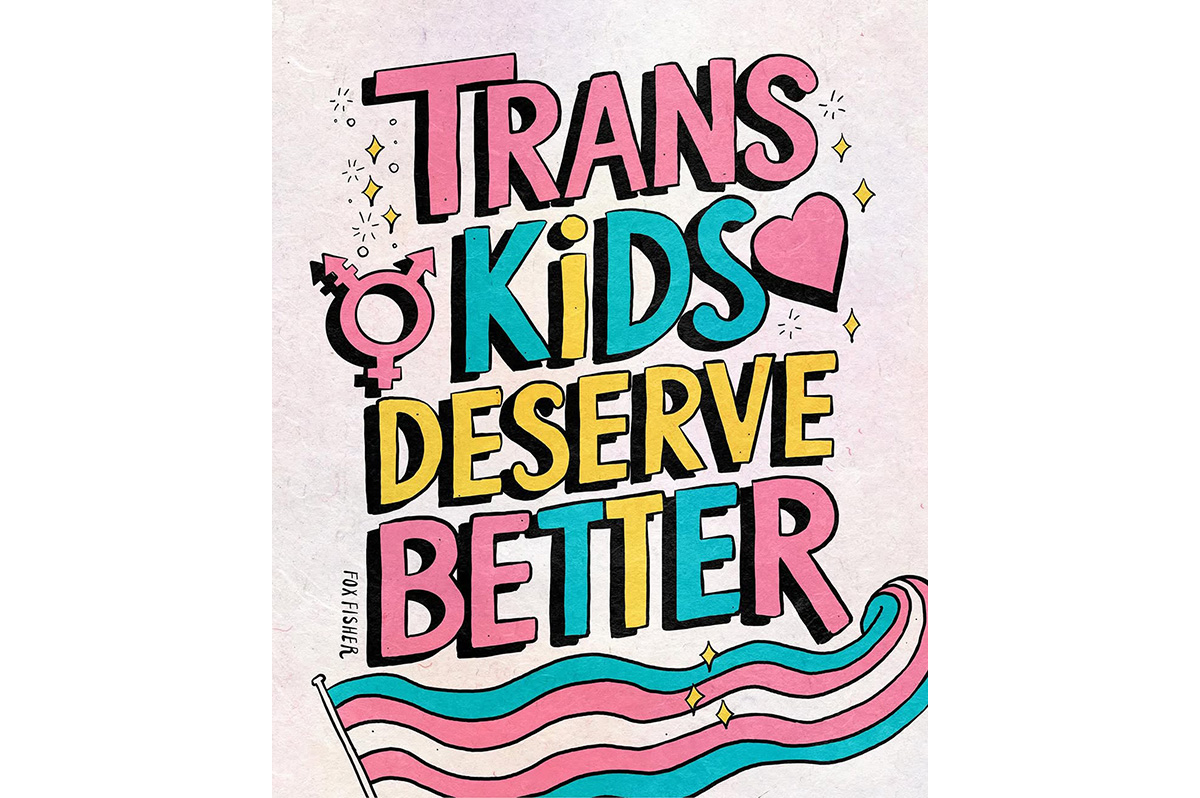
Politicians and the media have recently taken to speaking about trans kids; how to “protect” children who think they are trans.
The problem with such conversations is that the voices of transgender children and teenagers are ignored. Their existence is erased and even denied. Too often, transgender minors are discriminated against in the name of their own “protection.” And only a few have the resources or opportunities to speak up.
But not in the UK.
Despite Britain’s reputation for exporting transphobic ideas around the globe — fueled in part by a vocal trans-exclusionary radical feminist movement, most visibly represented by J.K. Rowling) — the country has one of the most prominent youth-led initiatives there, Trans Kids Deserve Better.
The Washington Blade spoke with their representative, Ashes, to learn more about them, and maybe even learn something from them. After all, the fight for trans rights is global for Trans Kids Deserve Better.
BLADE: Tell us a little bit about the group history.
“Trans Kids Deserve Better (TKDB) was founded in June 2024 by two trans kids after they were driven to action by what they read in the news,” said Ashes, referring to the situation when the British National Health Service started to deny hormone therapy for transgender minors, and conservative transphobic voices became much more prominent in the media. “Our first action was a banner drop on NHS England, which then turned into a four-day occupation as more and more people joined in. What started as a small action group between friends attracted many other trans kids, and eventually, TKDB became a full-scale action network made up of dozens of children throughout the country.”
BLADE: What, in the group’s opinion, is the main problem trans minors face today in the UK?
ASHES: The biggest problems trans kids face in the UK stem from how we are constantly ignored and scapegoated in both politics and everyday life. For example, our British Health Secretary Wes Streeting ignored trans children for whom puberty blockers were life-saving medical care, and instead just banned the usage of puberty blockers for trans kids. Far too often, people pretend we don’t exist. Or they will use trans people — especially in politics — as a means of deflection. Or we are painted as a threat. Both lead to alienation, which creates spaces where trans people can be mocked, harassed, ostracised, not taken seriously, and denied their universal rights. We see this happening everywhere, from school spaces to the government. It is terrifying being villainized and ignored by the very people who are supposed to keep you safe, and it fosters an environment that can be incredibly dangerous to the physical and mental health of trans kids.
BLADE: Tell us a little bit about your most important protests and campaigns. Are they connected? What do you do to reach your goals?
ASHES: Well, most of our actions are separate from each other, but we do also have some continuous campaigns. For example, our campaign Kids Are Dying, Wes (KADW) has been ongoing for over a year and aims to draw attention to and call out Health Secretary Wes Streeting for his role in the puberty blocker ban. We were placing paper coffins outside Wes Streeting’s office to represent the deaths of the trans children caused by his actions. We ended this daily protest just recently, after a full year of no comment from Wes — although he can’t fully pretend we don’t exist, because he blocked our page and KADW on social media. But there’s still more to come from KADW! We are also always coming up with new action ideas.
BLADE: Why do you think it is important for LGBTQ adults to listen to trans kids?
ASHES: Because even LGBT+ adults, who have their own experiences and contribute a lot to activism, will not have the experience of being a trans kid in this exact day and age. Because we’re teens, trans, and have first-hand experience, we have a unique perspective on modern-day education, healthcare, politics, and social media, especially when those topics concern us. When advocating for trans kids, it’s important to include actual kids in these conversations; nobody knows better what trans children need than those trans children themselves.
BLADE: And what about the international meaning of social movements such as Trans Kids Deserve Better? Why can such European campaigns be important for Americans?
ASHES: Recently, Nigel Farage, the leader of the Reform UK party [a far-right political party that has gained more and more influence in the UK] and a blatant transphobe, has said he wants to “Make Britain Great Again,” naming Donald Trump as one of the inspirations for his politics. This is a key example of how British and American politics especially are very interlinked — and so are the rights of minorities across these countries and beyond. Because while wanting rights for trans people and other minorities should not be deemed political, it is. Transphobic rulings passed in one country can inspire the leader of another country to do something similar. Prominent figures in Britain, especially local trans-exclusionary radical feminists, are influential throughout the world — particularly J.K. Rowling, who actively uses her money to campaign against trans rights. But more positively, thanks to social media and the news, trans activism can inspire people from completely different countries to come up with their own actions, or even just give them hope and encourage them to get through the day. We are all fighting the same fight.
-

 Colombia4 days ago
Colombia4 days agoLGBTQ Venezuelans in Colombia uncertain about homeland’s future
-

 District of Columbia4 days ago
District of Columbia4 days agoD.C. bar Rush facing eviction on charge of failing to pay rent
-

 District of Columbia4 days ago
District of Columbia4 days agoD.C. non-profits find creative ways to aid the unhoused amid funding cuts
-

 Sports4 days ago
Sports4 days agoBlade, Pride House LA announce 2028 Olympics partnership

